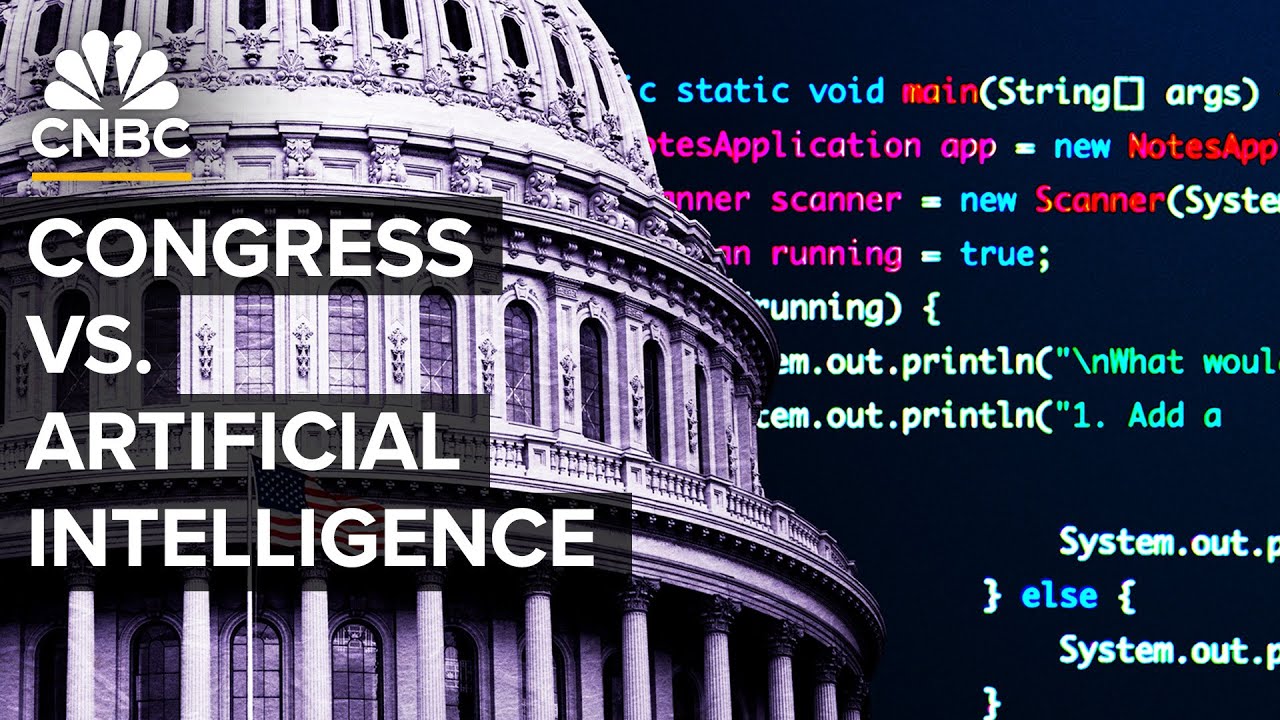Artificial intelligence is
already changing business in The United States. Researchers estimate that
about 60% of jobs in Advanced economies could be
impacted by AI. Like with all technological
revolutions, I expect there To be significant impact on
jobs. I think if this technology
goes wrong, it can go quite Wrong. Some companies are already
seeing the effects. It basically does the job of
700 full time agents, and It's happening probably at
an unprecedented pace Compared to some other
industrial revolutions that We've seen historically. There will be a time in the
future where robots can do Most of what humans
currently do. We're not there yet, and
shame on us if we end up Using it to make people
worse off. Congress so far has focused
on research and risk Assessment across at least
15 laws on the subject, but Experts say there's more
work to be done. I've come to the conclusion
that it's impossible for Congress to keep up with
the speed of technology. Right now, their goal is to
basically come up with What's going to be a to do
list for future years. As the development of AI
speeds up, politicians are Looking into robot taxes,
32 hour workweeks, deepfake Mitigation and robocalls to
confront the looming risks. Will the US government be
able to control AI tools? Artificial intelligence is
making workers more Productive. Productivity comes from
improvements in technology. The steam engine was a big
technology that that raised Living standards.
Electricity, computers and Now artificial intelligence
is the great general purpose
Technology of our era. For example, one study found
that workers who use AI Assistants increased their
productivity by 14% per hour On average. This particular
study focused on customer Service call centers. Newer workers, the less
skilled workers got the Biggest gain. They got up
about a 35% gain, whereas The most skilled workers
got basically zero gain. So it was kind of a
leveler. Part of what seemed to be
going on was that it was Capturing the tacit
knowledge about how to Create good answers from
the best workers, the best Answers, and making it
accessible to the rest of The workers. Economists and politicians
believe this technology Could be deployed very
quickly, and in fact, it Already has. When we launched this AI
chatbot, what blew us away Was just that it basically
was capable of taking care Of two thirds of all the
incoming errands that we Have over chat, and was
doing so with same or even Many times higher customer
satisfaction score than the Human agents were. Sebastian Siemiatkowski is
the CEO of Klarna, a Sweden Based financial services
provider. The company offers buy now,
pay later options on Websites for over 500,000
merchants, including Nike, Instacart, Yeti, Rei and
Brooks Brothers. The first thing the customer
writes in the chat is agent Like, I want to speak to a
human, and I think the Reason for that is simply
that all of us have had such A horrible experiences of
these chatbots that were so Not intelligent. But the difference with
this chatbot that we
Launched is that people
appreciate it. It's fast. It's to the
point it actually resolves Their errands in general,
an average time of Resolution. So like when
the customer starts chatting With us and actually
resolves, that could be About ten minutes with a
human agent while it's been About two minutes with the
AI. So I think that
unfortunately we may end up Having a significant amount
of permanent technological Unemployment, that income
and wealth inequality will Rise. The concerns about
inequality have led Economists to study robot
taxes. The idea is to charge
companies that use Technology to displace
workers. The funds would help
governments make up for the Loss of income and payroll
taxes that robots aren't Charged, with some revenue
set aside to support Displaced workers, the
ideal level for this tax Would be 1 to 3.7%,
according to researchers at MIT. By comparison, both
employers and employees pay 7.65% for payroll taxes, in
addition to other taxes at The federal, state, and
local levels. One of the first rules of
taxation is whatever you Tax, you get less of. Robots are part of what
boost technological growth. So I'm not sure we want to
have less of that. In 2023, a group of New York
State Assembly members Introduced a bill that
taxes corporations that use AI algorithms that replace
workers in the state. But it's not law. Yet
lawmakers in Washington are Far away from deciding on
policy details like this. So I wouldn't expect
anything on AI right away. At least not a really
impressive comprehensive
Package. If there is an
emergency, say, in the next Year, in the next couple of
years, that might spur Congress to act. A potential tax on robots
would have to be extremely High to alleviate
inequality, according to a Kellogg School of
Management study. But even then, economists
worry that it could shrink The United States economic
competitiveness. Other members of Congress
take a different approach in Light of the rapid
development of AI. For example, Bernie Sanders
has proposed shortening the Workweek to four days. Technology has made working
people far more productive, And what has been the
result of all of that Productivity increase for
working people? Almost all of the economic
gains of that technological Transformation have gone
straight to the top, while Wages for workers have
remained stagnant or even Worse. Researchers believe that AI
tools are not yet well Developed enough to fully
replace human beings. If you've used ChatGPT, you
know that it's fun and it's Cool, but it sometimes
makes mistakes. It can hallucinate where it
just makes up things that Aren't true. That hasn't stopped
investors from piling money Into the tech sector,
expecting huge gains in the Future. Companies like
Microsoft, Google, Apple, And Meta are all developing
artificial intelligence Copilots. But the dominant
brand, OpenAI, isn't traded On public markets. OpenAI is of the highest
quality and gives us the Best experience, but
there's tons of internal Work on top of that amazing
technology that they, you
Know, help us with. Klarna says that OpenAI's
assistant tool is estimated To produce $40 million in
profit improvement in 2024. Large language models like
ChatGPT and Claude and Gemini tend to work better. The bigger they are, the
more data they have. It is often kind of a
winner take all or winner Take most game. Over 50,000 workers lost
tech jobs in 2024 as of April. In some cases,
leaders were making room for New talent who could
develop AI tools. Artificial intelligence is
really at play here. When you really look at the
numbers of people that are Being restructured or being
laid off, you're looking at A lot of white collar jobs. Goldman Sachs predicted that
300 million jobs could Change as AI tools roll
out. Jobs that involve physical
work are less likely to be Affected. For example, IBM
told its employees that it's Cutting down jobs in its
marketing and communications Division, while massively
upskilling all of its Employees on AI. Revenue per employee is
going to be significantly Higher than what we've seen
historically, and I think it Will benefit the employees
of those companies because They will also pay more per
employee. A survey of 1400 US business
leaders suggests that most Corporate executives will
hire more people as a result Of generative AI, not less. Experts believe that's
because the tools currently Can make workers more
productive, but can't Replace them altogether. The technology is having an
impact in some parts of the Market, but I don't think
it's having a broad based
Effect yet. Over the coming
years, we'll see more Effects. The federal government is in
a race against time to Understand AI before the
products become even Stronger. Congress failed to meet the
moment on social media. Now we have the obligation
to do it on AI before the Threats and the risks
become real. It's not just about the
copyright holders of today And those who will generate
new copyright with the Assistance of AI. It's about whether America
will lead the world. In 2024, the House of
Representatives launched a Task force to address the
wide ranging risks raised by Tools that can mimic human
thought, language, likeness And more. A part of the idea behind
the task force is if you Look at who's on it, it's a
bunch of different Democrats And Republicans from
various committees. The idea here is to kind of
have one coordinating body. So as committees begin to
do their work, you do have Someone who's kind of
keeping an eye on everything That's happening and maybe
helping to coordinate a Little bit as those bills
move through committee and, Who knows, potentially come
to the floor. Leaders in Washington are
relying on the industry Itself for some of the
answers. The White House has
garnered commitments from 15 Companies to drive safe
development of AI. You know, smart regulation
can be helpful. It can actually even speed
up the adoption of Technologies and protect
people from harms. But at the same time,
overregulating can be Harmful and slow down
adoption.
The US government appears to
be moving slower on Regulation when compared to
its peers. For example, in March 2024,
the European Union banned High risk uses of
artificial intelligence, Which includes applications
in critical infrastructure, Health care, banking, the
justice system and Education. The folks in Brussels, they
come up with a lot of Bureaucratic rules that
make it harder for companies To innovate. The
entrepreneurial environment Isn't there the way it is
in the United States. Which means that Americans
may be more exposed to the Ups and downs of AI as the
technology advances. I think what you're going to
probably see is what you see For a lot of other issues. You're going to be seeing
Republicans taking the route Of less regulation, more
room for creativity, for Growth, and for the
economy. And then for Democrats,
you're going to see kind of More of a concern. Is AI
trying to discriminate Against anyone? Could this
be something that actually Winds up hurting people
rather than helping them? The critical question, the
one that I would, you know, Urge policymakers to
consider is how do we Support the people whose
jobs are affected in a smart Way, and so that it becomes
truly a positive outcome for The whole of society? There will be a time in the
future. Where robots can do most of
what humans currently do. We're not there yet. Over time, we're going to
have to update our tax System and even move to
systems like Universal Basic Income that make sure
everybody get a share of the Benefits that are created.






